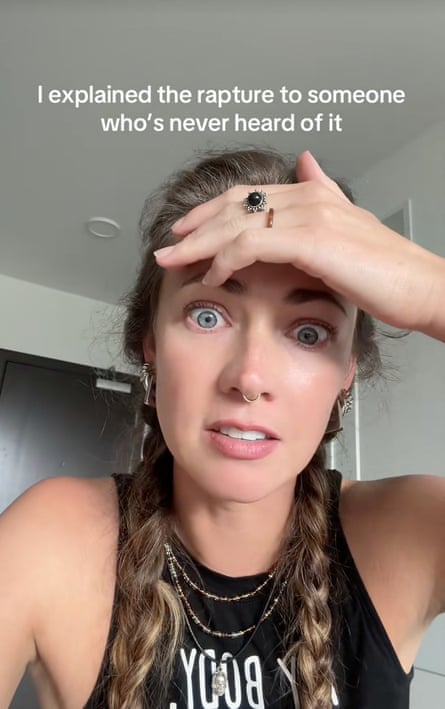If you believe a vocal cohort of evangelical Christians on social media, consider Tuesday 23 September – or maybe Wednesday 24 September – a wrap on this whole society thing. For the first time, the rapture is playing out on TikTok.
Believers have taken to the app to disclose their preparation for impending doom, claiming to have sold their cars or requested “eternity leave” from their employers, and fretting over whether the family dog gets to come to heaven too. One woman advised her followers to do away with their phones’ password protections, so that any loved ones that get left behind can easily access their personal information. Another bought Bibles in bulk at Dollar Tree, which she planned to leave behind with personalized notes in hopes of saving some last-minute converts.
Evangelical Christians who believe in the rapture describe it as a fundamental doctrine: the idea that one day, true believers of God will ascend into heaven, ending life as we know it – while the rest are left behind for a seven-year period of suffering at the hands of the antichrist.
Since the theory was popularized in the early 1800s by a British clergyman named John Nelson Darby, there have been countless false alarms: in 1844, a New York farmer turned Baptist preacher named William Miller amassed thousands of followers through preaching a second coming that never materialized, in an event later dubbed the Great Disappointment. When Halley’s comet passed through the sky in 1910, scammers sold “anti-comet pills” intended to save souls. In 1997, the Hale-Bopp comet led 39 members of the Heaven’s Gate cult to die by mass suicide.
This time around, the call came from the South African preacher Joshua Mhlakela, who spread the word during a June podcast appearance. “The rapture is upon us, whether you are ready or not,” Mhlakela said. The theory quickly translated to TikTok, where the hashtag #rapture has more than 290,000 posts.
Tyler Huckabee is the managing editor at Sojo.net, a progressive Christian publication, where he says the newsroom’s “joke of the day” is that deadlines have ceased to matter. “This is by no means my first rodeo in terms of a certain sect of Christian theology that starts the rumor about the end of the world, and that catching fire,” Huckabee said. “Facebook definitely had it, Twitter had it, but it’s TikTok’s first end of the world moment.”
Rapture reports thrive during times of tumult, said Matthew Gabriele, a professor in the department of religion and culture at Virginia Tech who studies apocalyptic movements. “If you’re a believing Christian, you don’t know when this is going to happen per se, but you look for the signs,” Gabriele explained. “Usually when things are getting ‘really bad’, that’s when the elect will be saved. So it’s not a surprise that [people are predicting the rapture] in this particular moment, where there’s political violence, economic concerns, disease, etc – these are very common tropes within apocalyptic texts.”
Indeed, the phrase “end times” is often thrown around on social media to describe our fractured, collapsing reality of plague-like pandemic, biblical-level natural disasters and mass violence. In the last week, believers have linked Charlie Kirk’s assassination to the rapture theory: some on TikTok have suggested that Kirk, who in death became a martyr for Christian nationalists and whose memorial service veered into religious revival territory, could be resurrected during the rapture.

Jess Lauren, a 27-year-old content creator who also runs a clothing startup, grew up “heavily involved” in the Christian church. Both of her parents were pastors. While attending the University of California, Davis, Lauren began to question her conservative, religious beliefs, joining the “deconstructing” movement – where former believers reconsider the dogma they accepted as children.
As a kid, she believed in the rapture, especially after reading Left Behind, a blockbuster apocalyptic book series co-written by Tim LaHaye, a homophobic minister who believed in the Illuminati, and the Christian writer Jerry B Jenkins. (It was later adapted to film multiple times, including a 2014 version starring Nicolas Cage.) Lauren grew up as the youngest of four kids, meaning she rarely came home to an empty house. If she ever did, Lauren would head out on to the street to look for rapture survivors. “I’d be like, ‘OK, are there less people driving today? Have I been left behind?” she said.
Ditto for April Ajoy, a podcaster and author of the memoir Star-Spangled Jesus: Leaving Christian Nationalism and Finding a True Faith. “When I was 13, I legitimately thought I’d been left behind because I was chatting on AOL instant messenger on our family computer, and the house got really quiet all of a sudden,” she said. “I started looking for my family, and I couldn’t find them anywhere. For about 20 minutes, I literally started prepping. I thought I was going to need to go to the military supply store, get food and go underground.
Then my family came back – they’d just gone on a walk. That’s really traumatizing.”
Ajay would pray “that God would hold off” the rapture until she got older, so she could experience graduating high school, getting married and having sex for the first time. At the same time, she was excited for it. “We’re taught that it’s a get out of death free card,” said Ajay. “You go straight to heaven, you don’t have to die, and you don’t live through the terrible things that happen on earth.”
Rapture rumors typically amp up in September, Ajay says, due to the Jewish holiday Rosh Hashanah, which is mentioned in the Bible. “But ultimately, I think any time people feel really out of control and scared, it’s prime time for them to start talking about the rapture,” she said.
On TikTok, the fear is not always so palpable. Many #RaptureTok posts fall into the breezy genre of quippy, conversational content that does well in the algorithm. Sara Reinis, a doctoral student at the University of Pennsylvania who studies religion and social media, has seen videos of moms sharing their end times prepping routines or giving tips for people who are left behind.
“They’re adopting the language of self-help, which is so prevalent on social media, and attaching it to the rapture discussion,” she said. “Some don’t really know if this is when the rapture is going to happen, but they think it’s still an important wake-up call to pay attention to. They’re hedging their bets.”
It’s not just believers who have pulled up a chair to #RaptureTok. Outside religious circles, social media users are encouraging anyone who is giving away material goods in preparation to throw some cash their way. In one parody video, a woman gives tips to people who are left behind, such as: “Stockpile VHS copies of Shrek. It’s now the new currency.” One X user pointed out that 23 September is also Bisexual Visibility Day, meaning that if a “second coming” did happen, it would also be Jesus’s “coming out day”.
So what will have changed if we wake up on Thursday? Huckabee, the Sojo.net editor, says that if past false flag raptures are any indicator, not much. People who go all-in on the rapture only to be proved wrong do not usually use it as an opportunity to reflect on their beliefs.
“There’s a very human fear of saying ‘I was wrong,’” Huckabee said. “So what I’ve tended to see from the people who quit their job because they think Jesus is coming back, or whatever, it’s that they say they got something wrong – maybe the date was a bit off, but it’s still coming soon. There’s always a way to kick the ball down the road.”

 3 months ago
91
3 months ago
91

















































